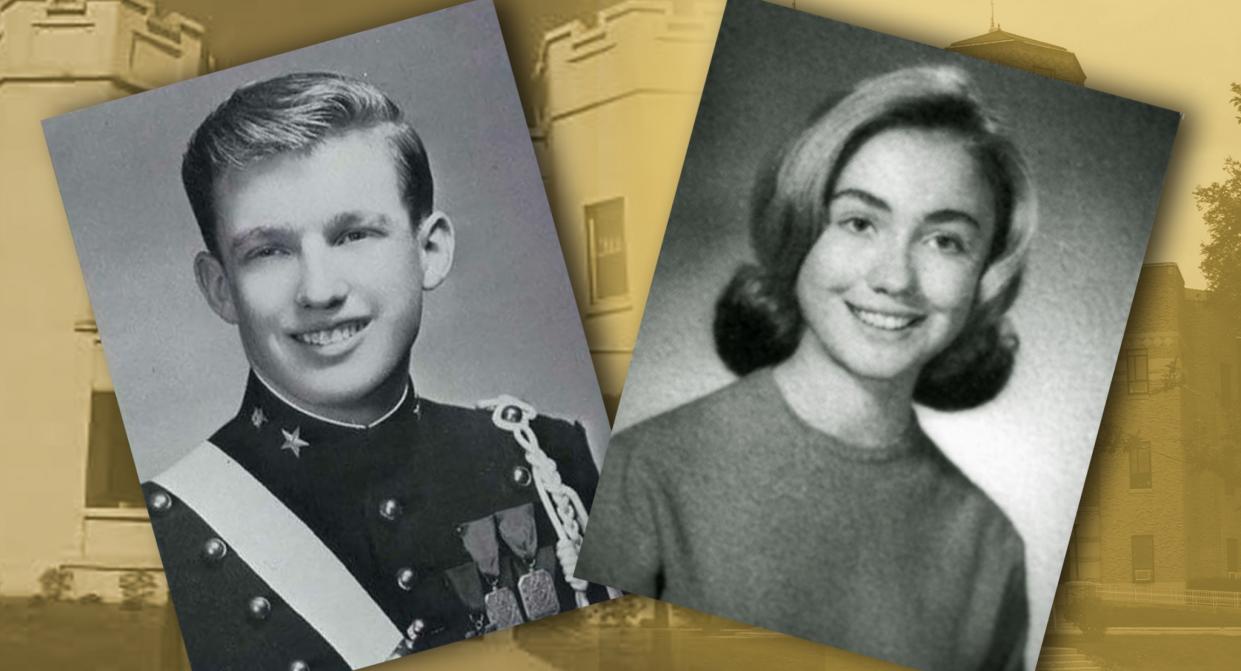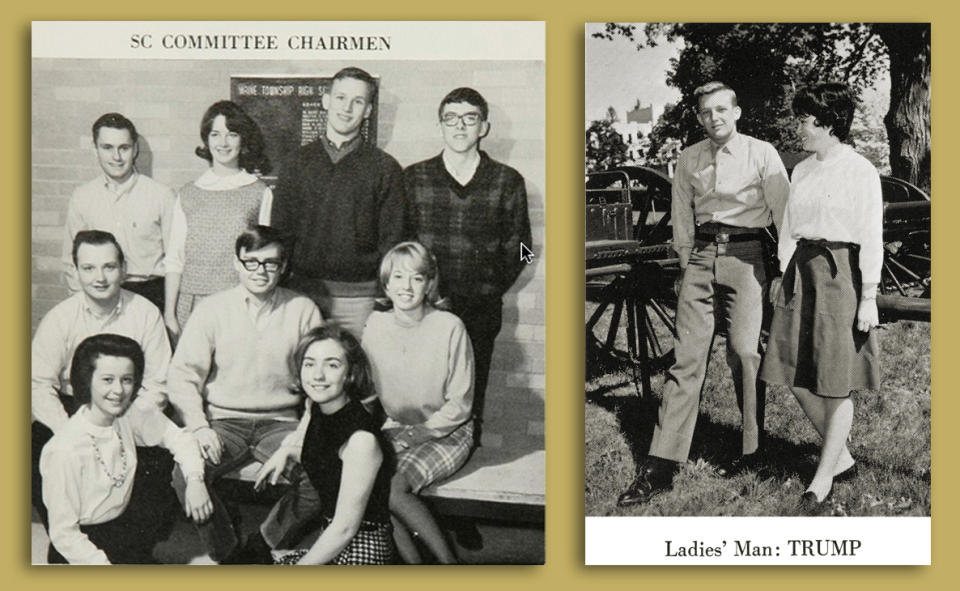Nerd vs. jock: Everything you need to know about Clinton and Trump, you learned in high school

This is not the first time Hillary Clinton made history as the first female to top a presidential ticket. Back in high school, she ran for president of the student government, surprising her classmates because no girl had ever done that before. They always served as secretary instead.
Nor is this the first time that Donald Trump has been called names — though perhaps not quite the ones he’s being called now. An alpha male even back in high school, he was voted a “Ladies’ Man” in his yearbook and described as a brawler by his classmates. He also seems to have let it be known that he was rich.
If all the world is a re-creation of high school, then this election is between two candidates who as teenagers already embodied the traits for which they have become famous, and, it’s safe to say, they would not have liked each other very much.
It just might explain why so many voters don’t like them either.
Clinton and Trump graduated just a year apart — he in 1964 from the New York Military Academy in Cornwall, N.Y., she in 1965 from Maine South High School in Park Ridge, Ill. But “the times” were just about the only thing they had in common.
Clinton was by all accounts an earnest, nerdy, uber-involved student. Think Hermione Granger at Hogwarts. Or Patty Simcox at Rydell. A Buzzfeed list of her high school activities runs 17 printed pages, but to name just a few, she was on the student newspaper, the “It’s Academic” TV quiz show team, the cultural values committee, the committee to write a new school constitution and the antivandalism committee.
She was also director of the school’s Republican organization (yes, she was an ardent Goldwater girl), vice president of the Honor Society, and vice president of the junior class (where she was regularly ticked off, friends say, that she ended up running most of the meetings because the president – the guy she would run against for president as a senior — was away at football practice.) She wasn’t valedictorian, but according to an article in the Boston Globe during her 2008 run, she told the student who was chosen that she thought she was smarter.
Trump, on the other hand, was the Biff Tannen of his crowd (somewhat literally, in fact — “Back to the Future” writer Bob Gale has said the character is based on Trump.) Sent to boarding school at 13 to “channel his energy in a positive manner,” according to the Washington Post, he seems to have poured much of that energy into sports. He played varsity soccer, baseball (the talk back then, his classmates say today, was that he could have gone pro) and football as well as JV wrestling, and intramural basketball and bowling.
He marched a lot too — serving as the commanding officer of the school honor guard for the New York City Columbus Day Parade — and was also a member of the committee for the fall dance, the Driver Education Club and the Hobby and Model Club. He received no academic awards to speak of, but he did win the Neatness and Order Medal in ‘60 and ’61, along with many athletic letters from ‘60 to ‘64. He got into occasional fights, classmates have recalled to reporters recently, because, as one told Business Insider last fall, “that’s common ground in that school. [It was] a little ‘Lord of the Flies.’” Oh, and he was voted “Ladies’ Man” in the yearbook because, as one of his classmates recalled to Business Insider, “He was a very good-looking, handsome guy, and he held himself in a way that everyone thought he’d be very desirable for the opposite sex.”

What does all this have to do with the outcome of the 2016 presidential election?
In fact, a surprising amount.
Sociologists, psychologists and anthropologists have spent a lot of time proving that who we become in life is forged during high school. Or, as Kurt Vonnegut has said, those years are “closer to the core of the American experience than anything else I can think of.” Take adult earning power. In men it has been shown to correlate to height – the taller the guy, the higher his lifetime income. But more specifically, the correlation is not with his adult height, but with his height at age 16. Similarly, low self-esteem in both adult men and women correlates to being overweight in adolescence. Attractiveness in high school correlates to higher chances of marriage and children in adulthood, and better mental health.
It seems clear that social sorting — dividing ourselves into groups, seeking those who are like us, rejecting those who are not – begins in middle school and hardens in high school. That makes sense from a neurodevelopment standpoint; puberty is the time when the human brain codifies its ability to read the emotions of others, making those years a constant (though not always accurate) scanning of what others are thinking about you.
What makes less sense is why the clustering and sorting that results follows into adulthood. To use the archetypes of “The Breakfast Club,” once a “brain, athlete, basket case, princess or criminal,” then, statistically, always thus.
Or, as Jennifer Senior wrote three years ago in a New York Magazine article titled “Why You Truly Never Leave High School”: “One has to wonder … whether the worst of adult America looks like high school because it’s populated by people who went to high school in America. We’re recapitulating the ugly folkways of this institution, and reacting with the same reflexes, because that’s where we were trapped, and shaped, and misshaped, during some of our most vulnerable years.”
One answer particularly relevant to the current political climate can be found in studies of why some high schools have more rigid cliques and caste systems than others.
The most detailed work on this question, the “Study of Network Ecology and Adolescent Social Structure,” was published two years ago in the American Sociological Review by Daniel A. McFarland, a professor at Stanford’s Graduate School of Education. It found that the bigger the school and the more choices of activities and groups available to students, the more pronounced the cliques. A small school with few electives means students are forced to interact with peers not of their choosing. A larger school, which allows students to pick their schedules, their lunch companions, their corners, is more likely to have clusters defined by race, gender, age, socioeconomics and popularity. Cliques and stereotypes provide shelter in a larger unknown.
And what larger unknown is there, what more multi-optioned place than modern culture — a social-media cafeteria where we can all seek out echo chambers of like-minded cohorts who reinforce our worldviews.
What makes this the ultimate high school election, then, is less that Clinton and Trump are archetypes forged in high school, but that the electorate is stuck back there too.
“We hated both of them back then,” says Rosalind Wiseman, author of “Queen Bees and Wannabes,” which was adapted into the movie “Mean Girls.”
Trump “reminds us of the guy who gets away with being obnoxious, the big douche who we let step all over us and are afraid of but also a little in awe,” and Clinton “is the smarty pants who knows everything [but] when she tries to be funny it comes off awkward.”
Which may explain why both of them have poll numbers showing the highest unfavorability numbers of any modern presidential candidates.
Will that determine who becomes president? Unclear. But there is this data point: That race for student council president more than 50 years ago? Clinton lost. To the captain of the football team.
